Global Supply Chain Management: A Unilever Case Study Report
VerifiedAdded on 2020/01/07
|18
|5945
|174
Report
AI Summary
This report provides a comprehensive analysis of Unilever's global supply chain management practices. It begins with an introduction to supply chain management and an overview of Unilever, a major consumer goods company. The report then delves into an interpretation of Unilever's Corporate Social Responsibility (CSR) report, focusing on how it relates to supply chain management and the triple bottom line model, aiming to improve the company's performance. It identifies Unilever's supply chain management strategies, discussing their advantages and disadvantages on operational activities. Furthermore, the report analyzes how Unilever utilizes technology to enhance its supply chain management processes, providing examples of successful competitor strategies. The report examines the impact of CSR, supply chain policies, and the triple bottom line model on Unilever's operations, including its stakeholders, employees, investors, and suppliers. The report concludes with a summary of findings and recommendations for optimizing Unilever's supply chain management for sustainable growth and improved performance.
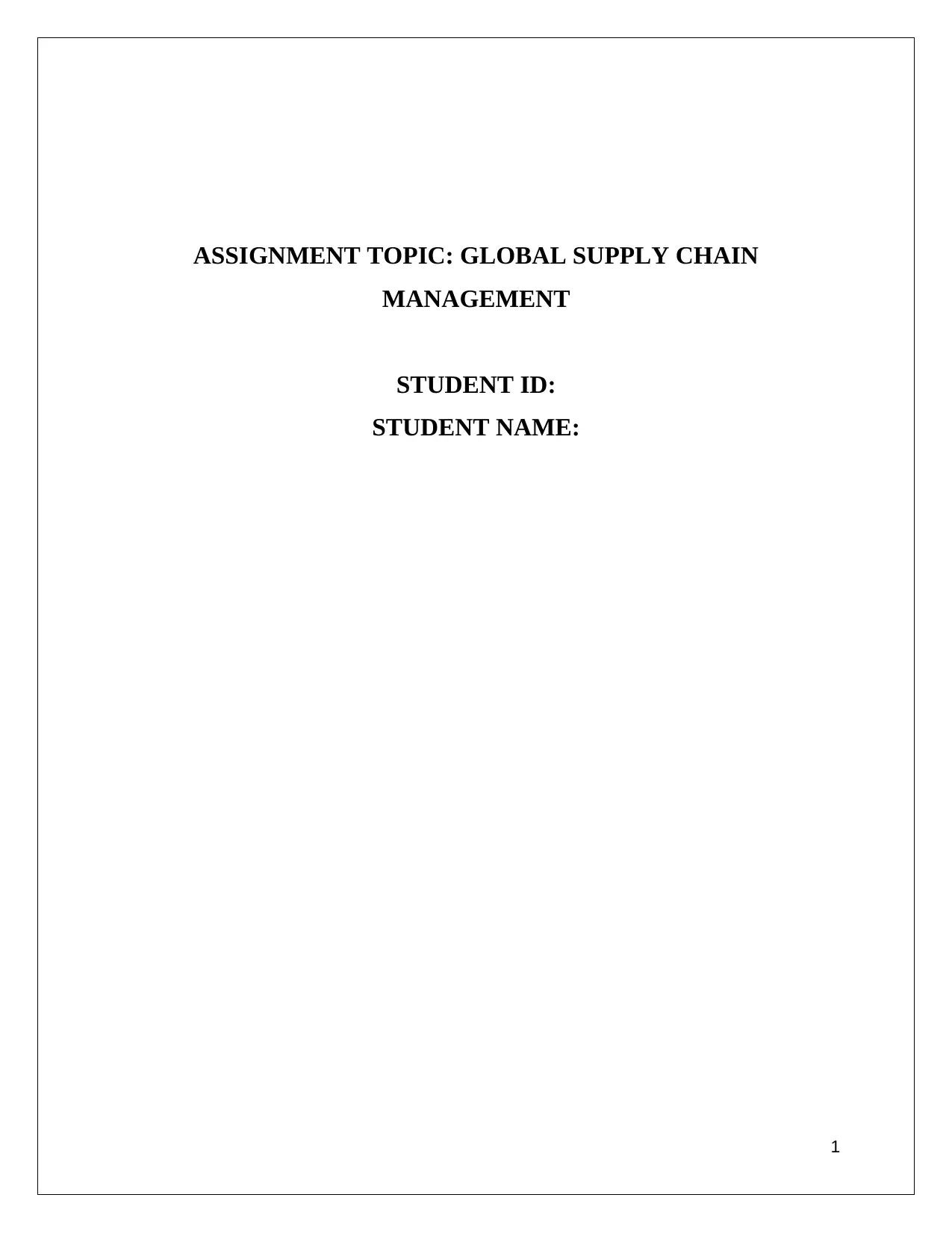
ASSIGNMENT TOPIC: GLOBAL SUPPLY CHAIN
MANAGEMENT
STUDENT ID:
STUDENT NAME:
1
MANAGEMENT
STUDENT ID:
STUDENT NAME:
1
Paraphrase This Document
Need a fresh take? Get an instant paraphrase of this document with our AI Paraphraser
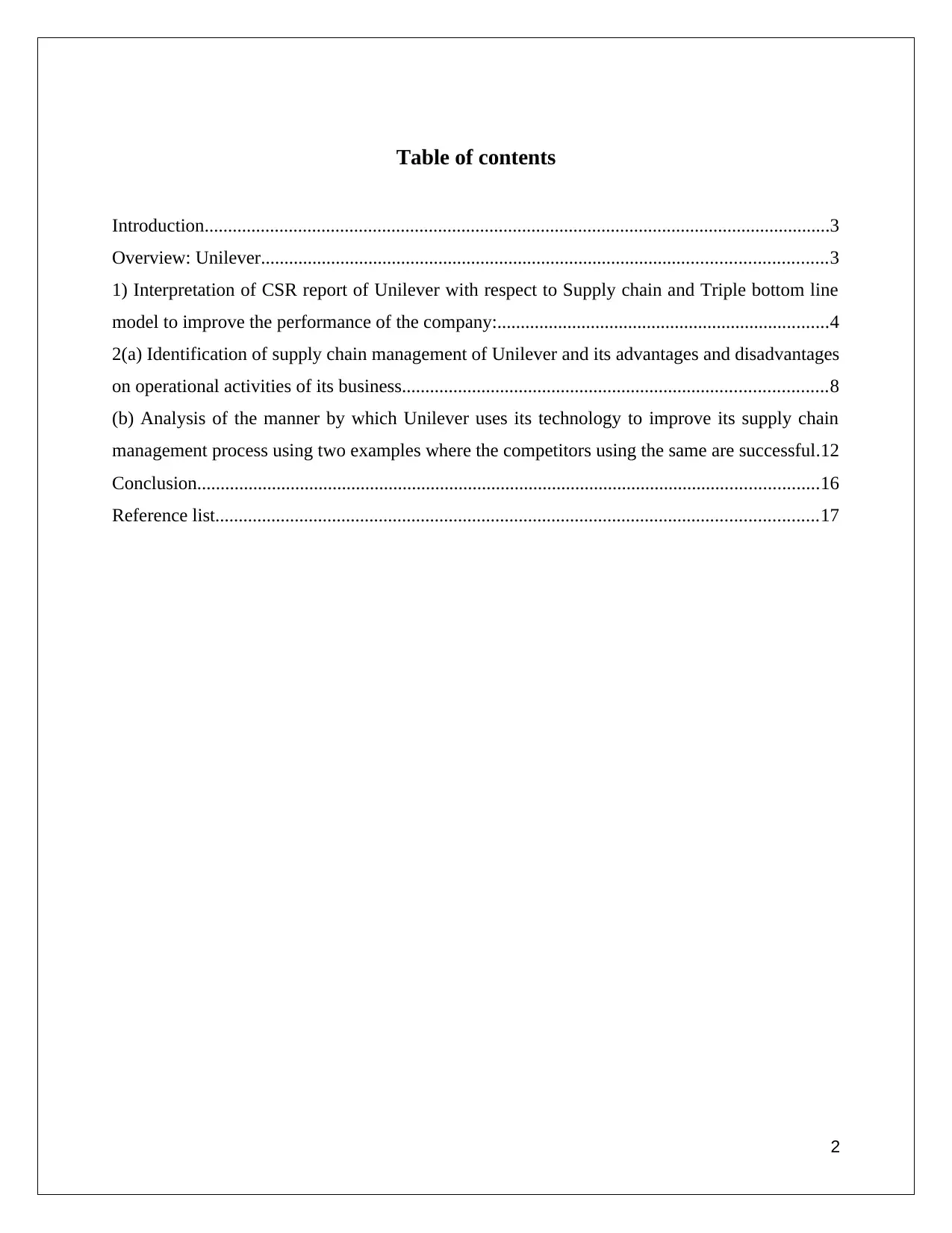
Table of contents
Introduction......................................................................................................................................3
Overview: Unilever.........................................................................................................................3
1) Interpretation of CSR report of Unilever with respect to Supply chain and Triple bottom line
model to improve the performance of the company:.......................................................................4
2(a) Identification of supply chain management of Unilever and its advantages and disadvantages
on operational activities of its business...........................................................................................8
(b) Analysis of the manner by which Unilever uses its technology to improve its supply chain
management process using two examples where the competitors using the same are successful.12
Conclusion.....................................................................................................................................16
Reference list.................................................................................................................................17
2
Introduction......................................................................................................................................3
Overview: Unilever.........................................................................................................................3
1) Interpretation of CSR report of Unilever with respect to Supply chain and Triple bottom line
model to improve the performance of the company:.......................................................................4
2(a) Identification of supply chain management of Unilever and its advantages and disadvantages
on operational activities of its business...........................................................................................8
(b) Analysis of the manner by which Unilever uses its technology to improve its supply chain
management process using two examples where the competitors using the same are successful.12
Conclusion.....................................................................................................................................16
Reference list.................................................................................................................................17
2
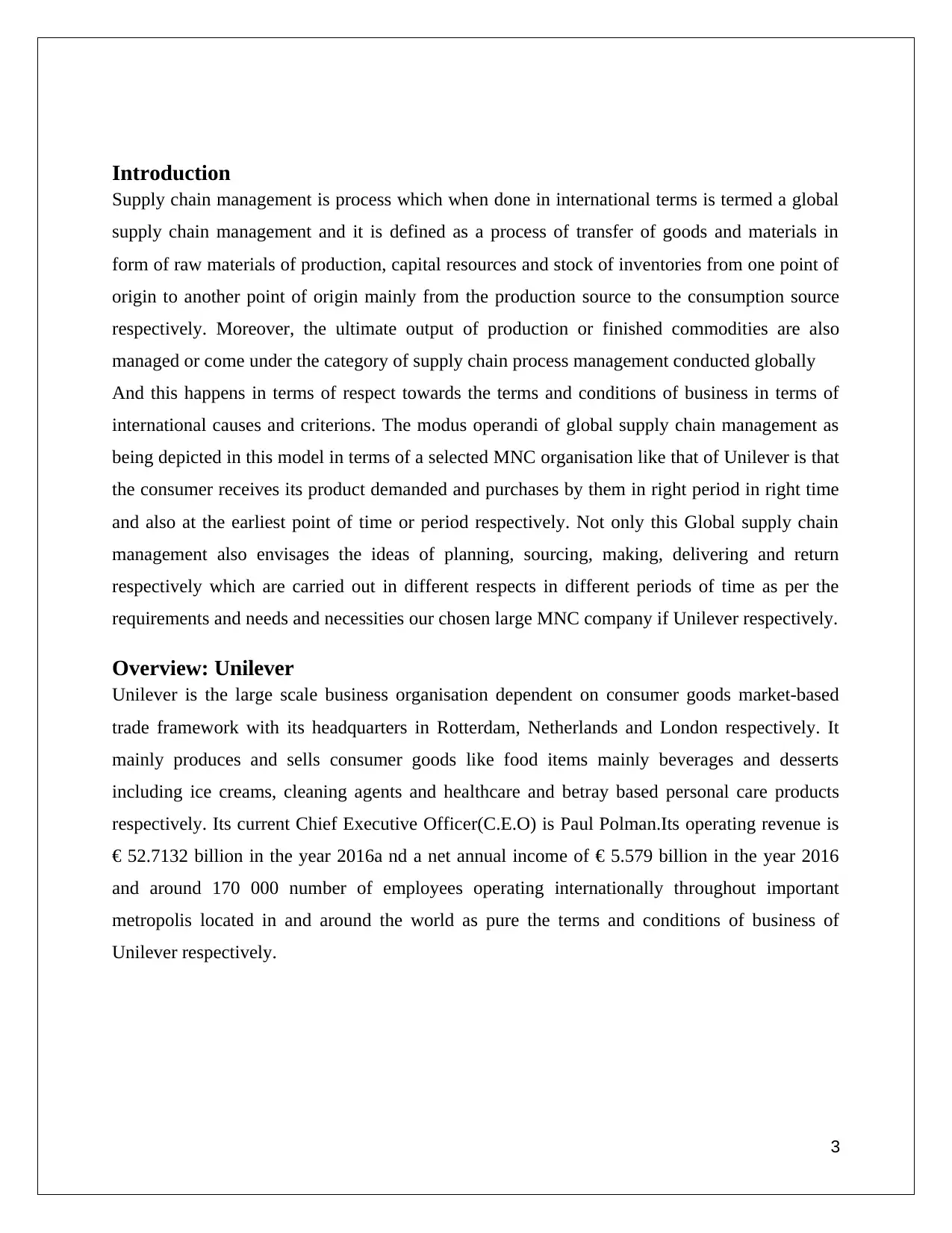
Introduction
Supply chain management is process which when done in international terms is termed a global
supply chain management and it is defined as a process of transfer of goods and materials in
form of raw materials of production, capital resources and stock of inventories from one point of
origin to another point of origin mainly from the production source to the consumption source
respectively. Moreover, the ultimate output of production or finished commodities are also
managed or come under the category of supply chain process management conducted globally
And this happens in terms of respect towards the terms and conditions of business in terms of
international causes and criterions. The modus operandi of global supply chain management as
being depicted in this model in terms of a selected MNC organisation like that of Unilever is that
the consumer receives its product demanded and purchases by them in right period in right time
and also at the earliest point of time or period respectively. Not only this Global supply chain
management also envisages the ideas of planning, sourcing, making, delivering and return
respectively which are carried out in different respects in different periods of time as per the
requirements and needs and necessities our chosen large MNC company if Unilever respectively.
Overview: Unilever
Unilever is the large scale business organisation dependent on consumer goods market-based
trade framework with its headquarters in Rotterdam, Netherlands and London respectively. It
mainly produces and sells consumer goods like food items mainly beverages and desserts
including ice creams, cleaning agents and healthcare and betray based personal care products
respectively. Its current Chief Executive Officer(C.E.O) is Paul Polman.Its operating revenue is
€ 52.7132 billion in the year 2016a nd a net annual income of € 5.579 billion in the year 2016
and around 170 000 number of employees operating internationally throughout important
metropolis located in and around the world as pure the terms and conditions of business of
Unilever respectively.
3
Supply chain management is process which when done in international terms is termed a global
supply chain management and it is defined as a process of transfer of goods and materials in
form of raw materials of production, capital resources and stock of inventories from one point of
origin to another point of origin mainly from the production source to the consumption source
respectively. Moreover, the ultimate output of production or finished commodities are also
managed or come under the category of supply chain process management conducted globally
And this happens in terms of respect towards the terms and conditions of business in terms of
international causes and criterions. The modus operandi of global supply chain management as
being depicted in this model in terms of a selected MNC organisation like that of Unilever is that
the consumer receives its product demanded and purchases by them in right period in right time
and also at the earliest point of time or period respectively. Not only this Global supply chain
management also envisages the ideas of planning, sourcing, making, delivering and return
respectively which are carried out in different respects in different periods of time as per the
requirements and needs and necessities our chosen large MNC company if Unilever respectively.
Overview: Unilever
Unilever is the large scale business organisation dependent on consumer goods market-based
trade framework with its headquarters in Rotterdam, Netherlands and London respectively. It
mainly produces and sells consumer goods like food items mainly beverages and desserts
including ice creams, cleaning agents and healthcare and betray based personal care products
respectively. Its current Chief Executive Officer(C.E.O) is Paul Polman.Its operating revenue is
€ 52.7132 billion in the year 2016a nd a net annual income of € 5.579 billion in the year 2016
and around 170 000 number of employees operating internationally throughout important
metropolis located in and around the world as pure the terms and conditions of business of
Unilever respectively.
3
⊘ This is a preview!⊘
Do you want full access?
Subscribe today to unlock all pages.

Trusted by 1+ million students worldwide
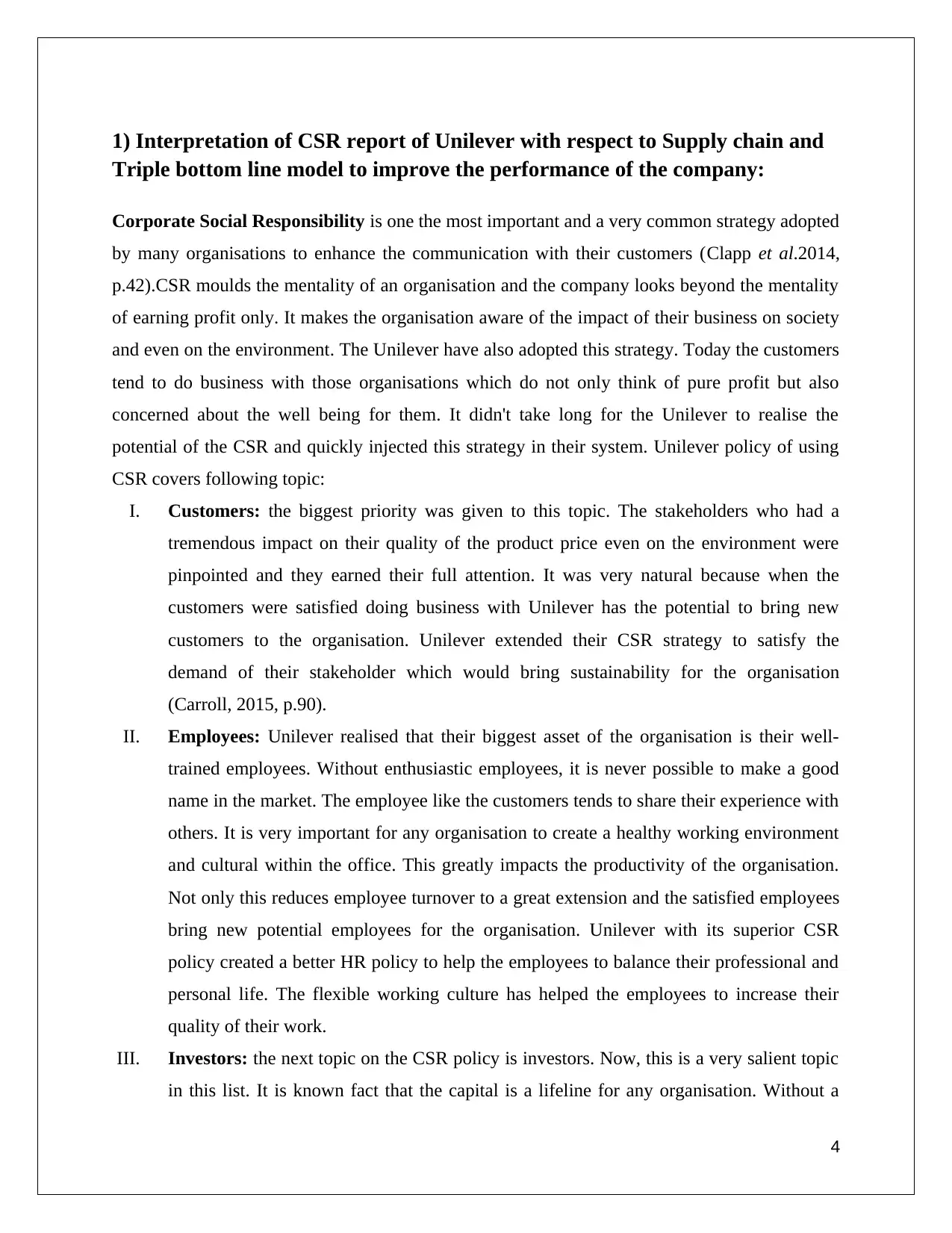
1) Interpretation of CSR report of Unilever with respect to Supply chain and
Triple bottom line model to improve the performance of the company:
Corporate Social Responsibility is one the most important and a very common strategy adopted
by many organisations to enhance the communication with their customers (Clapp et al.2014,
p.42).CSR moulds the mentality of an organisation and the company looks beyond the mentality
of earning profit only. It makes the organisation aware of the impact of their business on society
and even on the environment. The Unilever have also adopted this strategy. Today the customers
tend to do business with those organisations which do not only think of pure profit but also
concerned about the well being for them. It didn't take long for the Unilever to realise the
potential of the CSR and quickly injected this strategy in their system. Unilever policy of using
CSR covers following topic:
I. Customers: the biggest priority was given to this topic. The stakeholders who had a
tremendous impact on their quality of the product price even on the environment were
pinpointed and they earned their full attention. It was very natural because when the
customers were satisfied doing business with Unilever has the potential to bring new
customers to the organisation. Unilever extended their CSR strategy to satisfy the
demand of their stakeholder which would bring sustainability for the organisation
(Carroll, 2015, p.90).
II. Employees: Unilever realised that their biggest asset of the organisation is their well-
trained employees. Without enthusiastic employees, it is never possible to make a good
name in the market. The employee like the customers tends to share their experience with
others. It is very important for any organisation to create a healthy working environment
and cultural within the office. This greatly impacts the productivity of the organisation.
Not only this reduces employee turnover to a great extension and the satisfied employees
bring new potential employees for the organisation. Unilever with its superior CSR
policy created a better HR policy to help the employees to balance their professional and
personal life. The flexible working culture has helped the employees to increase their
quality of their work.
III. Investors: the next topic on the CSR policy is investors. Now, this is a very salient topic
in this list. It is known fact that the capital is a lifeline for any organisation. Without a
4
Triple bottom line model to improve the performance of the company:
Corporate Social Responsibility is one the most important and a very common strategy adopted
by many organisations to enhance the communication with their customers (Clapp et al.2014,
p.42).CSR moulds the mentality of an organisation and the company looks beyond the mentality
of earning profit only. It makes the organisation aware of the impact of their business on society
and even on the environment. The Unilever have also adopted this strategy. Today the customers
tend to do business with those organisations which do not only think of pure profit but also
concerned about the well being for them. It didn't take long for the Unilever to realise the
potential of the CSR and quickly injected this strategy in their system. Unilever policy of using
CSR covers following topic:
I. Customers: the biggest priority was given to this topic. The stakeholders who had a
tremendous impact on their quality of the product price even on the environment were
pinpointed and they earned their full attention. It was very natural because when the
customers were satisfied doing business with Unilever has the potential to bring new
customers to the organisation. Unilever extended their CSR strategy to satisfy the
demand of their stakeholder which would bring sustainability for the organisation
(Carroll, 2015, p.90).
II. Employees: Unilever realised that their biggest asset of the organisation is their well-
trained employees. Without enthusiastic employees, it is never possible to make a good
name in the market. The employee like the customers tends to share their experience with
others. It is very important for any organisation to create a healthy working environment
and cultural within the office. This greatly impacts the productivity of the organisation.
Not only this reduces employee turnover to a great extension and the satisfied employees
bring new potential employees for the organisation. Unilever with its superior CSR
policy created a better HR policy to help the employees to balance their professional and
personal life. The flexible working culture has helped the employees to increase their
quality of their work.
III. Investors: the next topic on the CSR policy is investors. Now, this is a very salient topic
in this list. It is known fact that the capital is a lifeline for any organisation. Without a
4
Paraphrase This Document
Need a fresh take? Get an instant paraphrase of this document with our AI Paraphraser
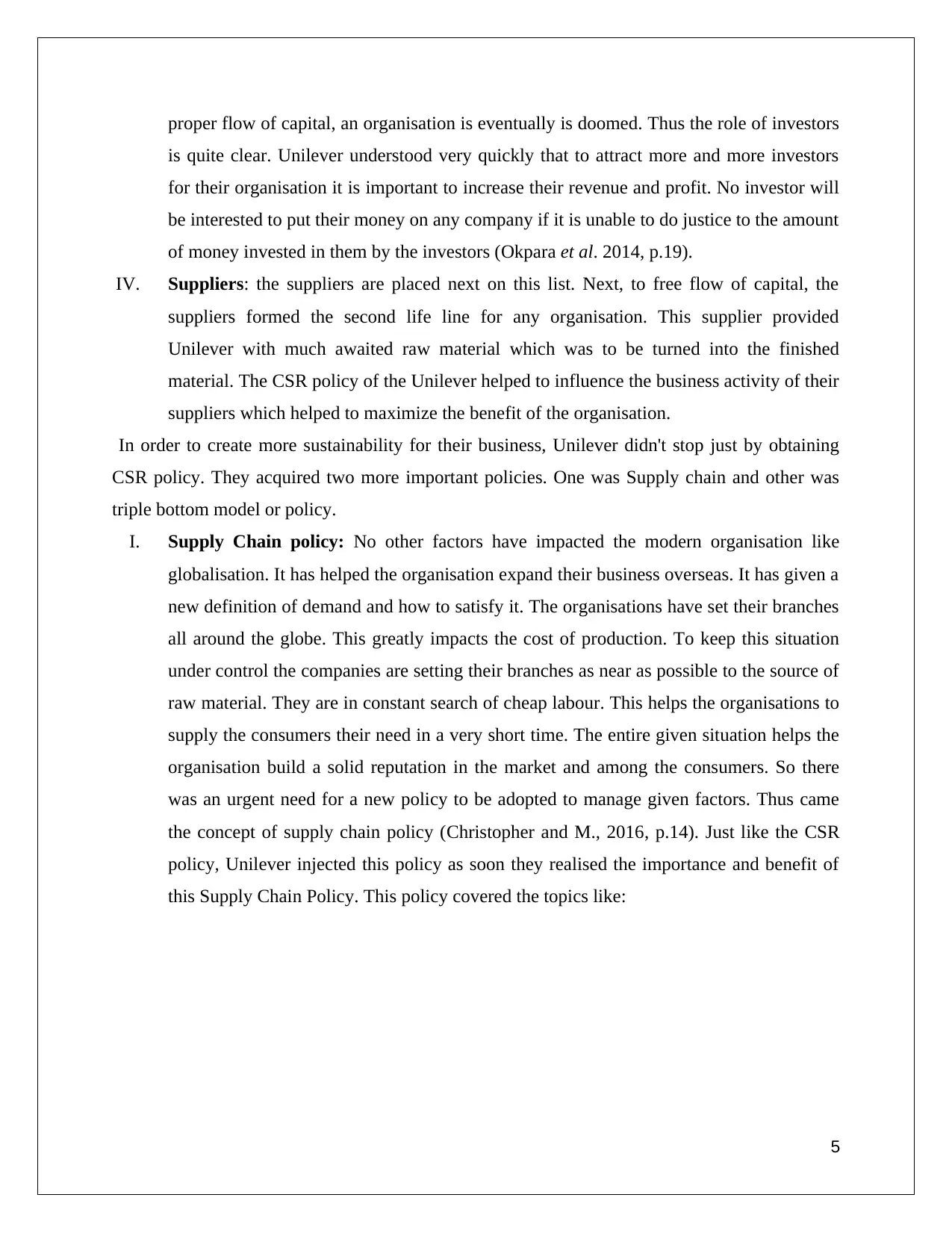
proper flow of capital, an organisation is eventually is doomed. Thus the role of investors
is quite clear. Unilever understood very quickly that to attract more and more investors
for their organisation it is important to increase their revenue and profit. No investor will
be interested to put their money on any company if it is unable to do justice to the amount
of money invested in them by the investors (Okpara et al. 2014, p.19).
IV. Suppliers: the suppliers are placed next on this list. Next, to free flow of capital, the
suppliers formed the second life line for any organisation. This supplier provided
Unilever with much awaited raw material which was to be turned into the finished
material. The CSR policy of the Unilever helped to influence the business activity of their
suppliers which helped to maximize the benefit of the organisation.
In order to create more sustainability for their business, Unilever didn't stop just by obtaining
CSR policy. They acquired two more important policies. One was Supply chain and other was
triple bottom model or policy.
I. Supply Chain policy: No other factors have impacted the modern organisation like
globalisation. It has helped the organisation expand their business overseas. It has given a
new definition of demand and how to satisfy it. The organisations have set their branches
all around the globe. This greatly impacts the cost of production. To keep this situation
under control the companies are setting their branches as near as possible to the source of
raw material. They are in constant search of cheap labour. This helps the organisations to
supply the consumers their need in a very short time. The entire given situation helps the
organisation build a solid reputation in the market and among the consumers. So there
was an urgent need for a new policy to be adopted to manage given factors. Thus came
the concept of supply chain policy (Christopher and M., 2016, p.14). Just like the CSR
policy, Unilever injected this policy as soon they realised the importance and benefit of
this Supply Chain Policy. This policy covered the topics like:
5
is quite clear. Unilever understood very quickly that to attract more and more investors
for their organisation it is important to increase their revenue and profit. No investor will
be interested to put their money on any company if it is unable to do justice to the amount
of money invested in them by the investors (Okpara et al. 2014, p.19).
IV. Suppliers: the suppliers are placed next on this list. Next, to free flow of capital, the
suppliers formed the second life line for any organisation. This supplier provided
Unilever with much awaited raw material which was to be turned into the finished
material. The CSR policy of the Unilever helped to influence the business activity of their
suppliers which helped to maximize the benefit of the organisation.
In order to create more sustainability for their business, Unilever didn't stop just by obtaining
CSR policy. They acquired two more important policies. One was Supply chain and other was
triple bottom model or policy.
I. Supply Chain policy: No other factors have impacted the modern organisation like
globalisation. It has helped the organisation expand their business overseas. It has given a
new definition of demand and how to satisfy it. The organisations have set their branches
all around the globe. This greatly impacts the cost of production. To keep this situation
under control the companies are setting their branches as near as possible to the source of
raw material. They are in constant search of cheap labour. This helps the organisations to
supply the consumers their need in a very short time. The entire given situation helps the
organisation build a solid reputation in the market and among the consumers. So there
was an urgent need for a new policy to be adopted to manage given factors. Thus came
the concept of supply chain policy (Christopher and M., 2016, p.14). Just like the CSR
policy, Unilever injected this policy as soon they realised the importance and benefit of
this Supply Chain Policy. This policy covered the topics like:
5
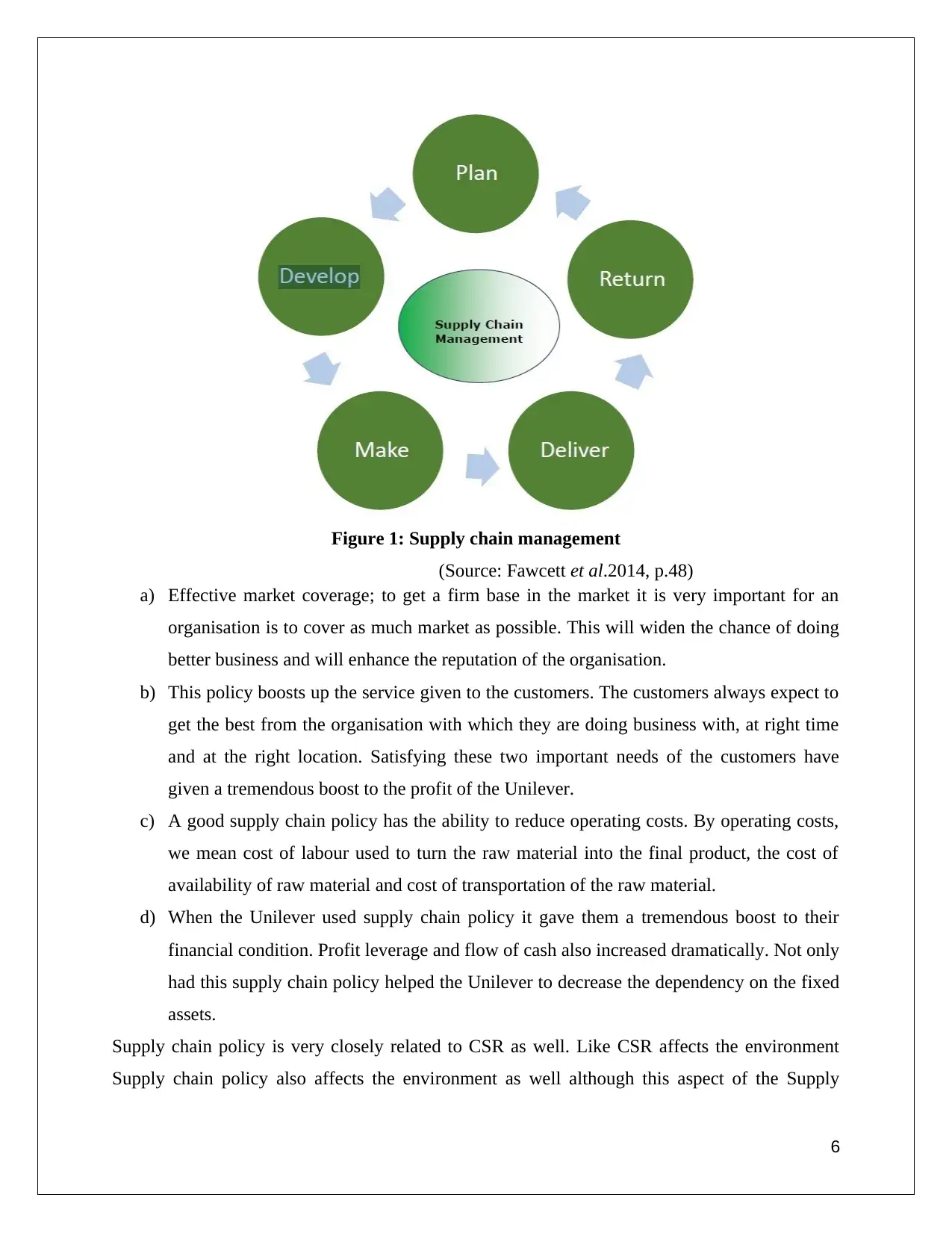
Figure 1: Supply chain management
(Source: Fawcett et al.2014, p.48)
a) Effective market coverage; to get a firm base in the market it is very important for an
organisation is to cover as much market as possible. This will widen the chance of doing
better business and will enhance the reputation of the organisation.
b) This policy boosts up the service given to the customers. The customers always expect to
get the best from the organisation with which they are doing business with, at right time
and at the right location. Satisfying these two important needs of the customers have
given a tremendous boost to the profit of the Unilever.
c) A good supply chain policy has the ability to reduce operating costs. By operating costs,
we mean cost of labour used to turn the raw material into the final product, the cost of
availability of raw material and cost of transportation of the raw material.
d) When the Unilever used supply chain policy it gave them a tremendous boost to their
financial condition. Profit leverage and flow of cash also increased dramatically. Not only
had this supply chain policy helped the Unilever to decrease the dependency on the fixed
assets.
Supply chain policy is very closely related to CSR as well. Like CSR affects the environment
Supply chain policy also affects the environment as well although this aspect of the Supply
6
(Source: Fawcett et al.2014, p.48)
a) Effective market coverage; to get a firm base in the market it is very important for an
organisation is to cover as much market as possible. This will widen the chance of doing
better business and will enhance the reputation of the organisation.
b) This policy boosts up the service given to the customers. The customers always expect to
get the best from the organisation with which they are doing business with, at right time
and at the right location. Satisfying these two important needs of the customers have
given a tremendous boost to the profit of the Unilever.
c) A good supply chain policy has the ability to reduce operating costs. By operating costs,
we mean cost of labour used to turn the raw material into the final product, the cost of
availability of raw material and cost of transportation of the raw material.
d) When the Unilever used supply chain policy it gave them a tremendous boost to their
financial condition. Profit leverage and flow of cash also increased dramatically. Not only
had this supply chain policy helped the Unilever to decrease the dependency on the fixed
assets.
Supply chain policy is very closely related to CSR as well. Like CSR affects the environment
Supply chain policy also affects the environment as well although this aspect of the Supply
6
⊘ This is a preview!⊘
Do you want full access?
Subscribe today to unlock all pages.

Trusted by 1+ million students worldwide
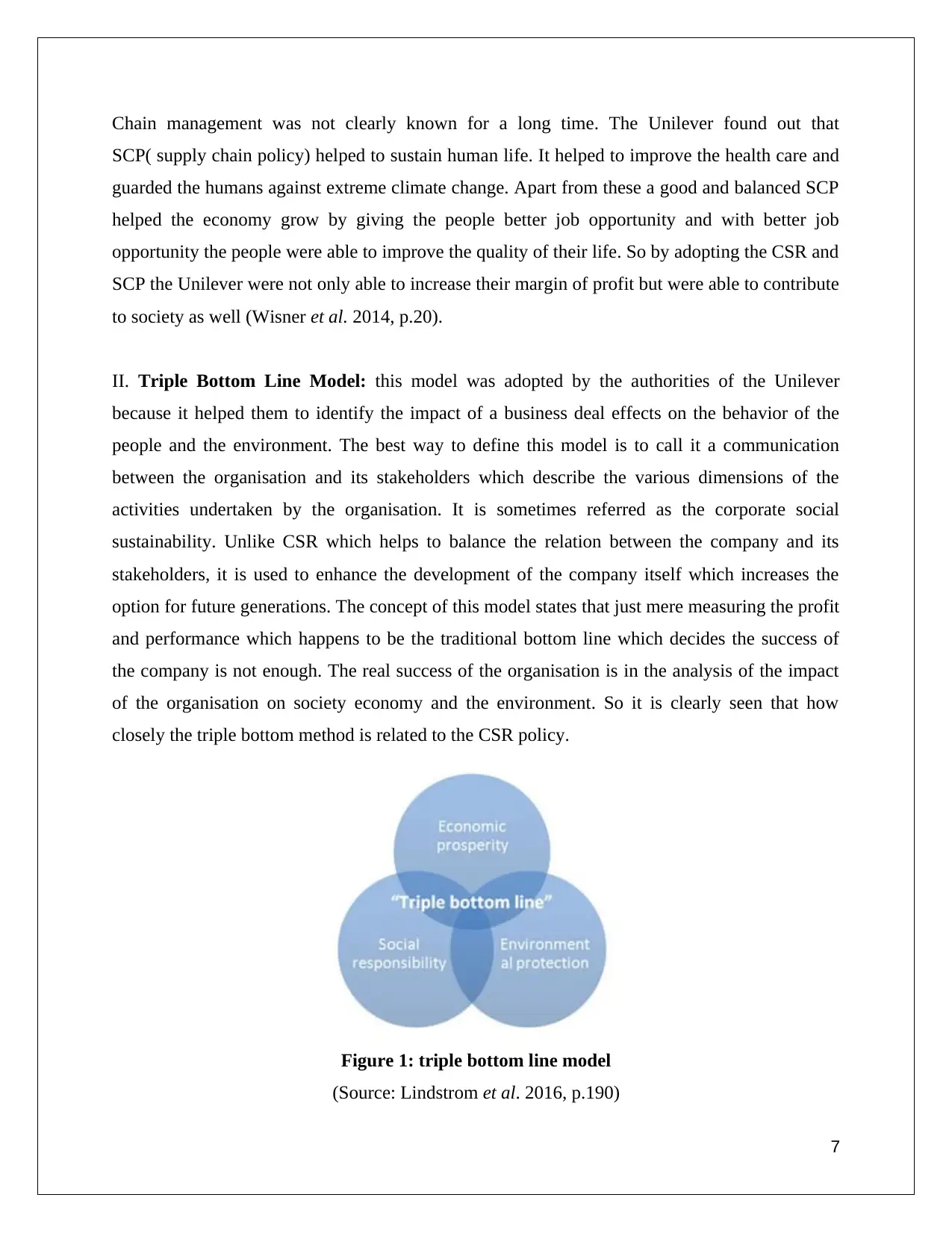
Chain management was not clearly known for a long time. The Unilever found out that
SCP( supply chain policy) helped to sustain human life. It helped to improve the health care and
guarded the humans against extreme climate change. Apart from these a good and balanced SCP
helped the economy grow by giving the people better job opportunity and with better job
opportunity the people were able to improve the quality of their life. So by adopting the CSR and
SCP the Unilever were not only able to increase their margin of profit but were able to contribute
to society as well (Wisner et al. 2014, p.20).
II. Triple Bottom Line Model: this model was adopted by the authorities of the Unilever
because it helped them to identify the impact of a business deal effects on the behavior of the
people and the environment. The best way to define this model is to call it a communication
between the organisation and its stakeholders which describe the various dimensions of the
activities undertaken by the organisation. It is sometimes referred as the corporate social
sustainability. Unlike CSR which helps to balance the relation between the company and its
stakeholders, it is used to enhance the development of the company itself which increases the
option for future generations. The concept of this model states that just mere measuring the profit
and performance which happens to be the traditional bottom line which decides the success of
the company is not enough. The real success of the organisation is in the analysis of the impact
of the organisation on society economy and the environment. So it is clearly seen that how
closely the triple bottom method is related to the CSR policy.
Figure 1: triple bottom line model
(Source: Lindstrom et al. 2016, p.190)
7
SCP( supply chain policy) helped to sustain human life. It helped to improve the health care and
guarded the humans against extreme climate change. Apart from these a good and balanced SCP
helped the economy grow by giving the people better job opportunity and with better job
opportunity the people were able to improve the quality of their life. So by adopting the CSR and
SCP the Unilever were not only able to increase their margin of profit but were able to contribute
to society as well (Wisner et al. 2014, p.20).
II. Triple Bottom Line Model: this model was adopted by the authorities of the Unilever
because it helped them to identify the impact of a business deal effects on the behavior of the
people and the environment. The best way to define this model is to call it a communication
between the organisation and its stakeholders which describe the various dimensions of the
activities undertaken by the organisation. It is sometimes referred as the corporate social
sustainability. Unlike CSR which helps to balance the relation between the company and its
stakeholders, it is used to enhance the development of the company itself which increases the
option for future generations. The concept of this model states that just mere measuring the profit
and performance which happens to be the traditional bottom line which decides the success of
the company is not enough. The real success of the organisation is in the analysis of the impact
of the organisation on society economy and the environment. So it is clearly seen that how
closely the triple bottom method is related to the CSR policy.
Figure 1: triple bottom line model
(Source: Lindstrom et al. 2016, p.190)
7
Paraphrase This Document
Need a fresh take? Get an instant paraphrase of this document with our AI Paraphraser
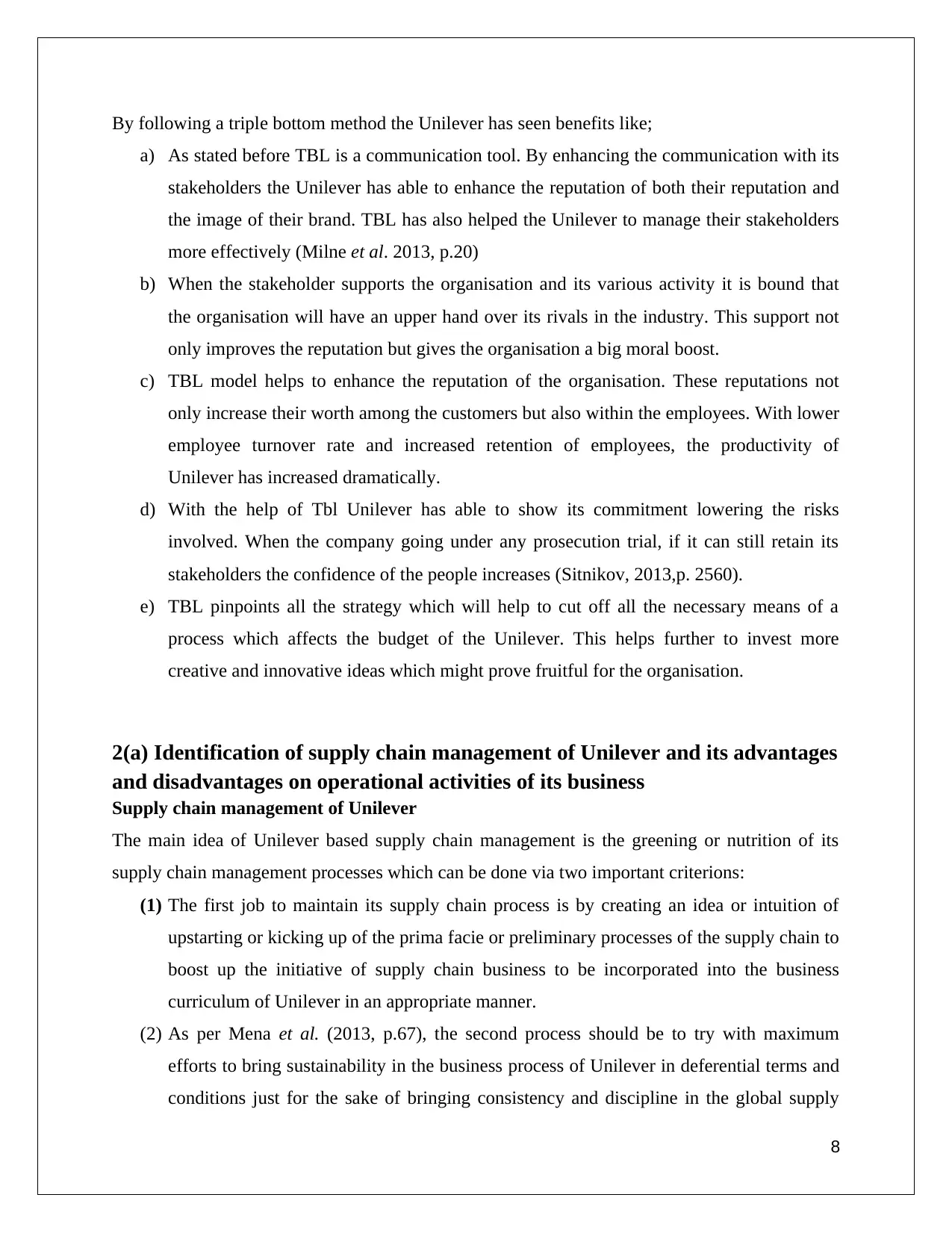
By following a triple bottom method the Unilever has seen benefits like;
a) As stated before TBL is a communication tool. By enhancing the communication with its
stakeholders the Unilever has able to enhance the reputation of both their reputation and
the image of their brand. TBL has also helped the Unilever to manage their stakeholders
more effectively (Milne et al. 2013, p.20)
b) When the stakeholder supports the organisation and its various activity it is bound that
the organisation will have an upper hand over its rivals in the industry. This support not
only improves the reputation but gives the organisation a big moral boost.
c) TBL model helps to enhance the reputation of the organisation. These reputations not
only increase their worth among the customers but also within the employees. With lower
employee turnover rate and increased retention of employees, the productivity of
Unilever has increased dramatically.
d) With the help of Tbl Unilever has able to show its commitment lowering the risks
involved. When the company going under any prosecution trial, if it can still retain its
stakeholders the confidence of the people increases (Sitnikov, 2013,p. 2560).
e) TBL pinpoints all the strategy which will help to cut off all the necessary means of a
process which affects the budget of the Unilever. This helps further to invest more
creative and innovative ideas which might prove fruitful for the organisation.
2(a) Identification of supply chain management of Unilever and its advantages
and disadvantages on operational activities of its business
Supply chain management of Unilever
The main idea of Unilever based supply chain management is the greening or nutrition of its
supply chain management processes which can be done via two important criterions:
(1) The first job to maintain its supply chain process is by creating an idea or intuition of
upstarting or kicking up of the prima facie or preliminary processes of the supply chain to
boost up the initiative of supply chain business to be incorporated into the business
curriculum of Unilever in an appropriate manner.
(2) As per Mena et al. (2013, p.67), the second process should be to try with maximum
efforts to bring sustainability in the business process of Unilever in deferential terms and
conditions just for the sake of bringing consistency and discipline in the global supply
8
a) As stated before TBL is a communication tool. By enhancing the communication with its
stakeholders the Unilever has able to enhance the reputation of both their reputation and
the image of their brand. TBL has also helped the Unilever to manage their stakeholders
more effectively (Milne et al. 2013, p.20)
b) When the stakeholder supports the organisation and its various activity it is bound that
the organisation will have an upper hand over its rivals in the industry. This support not
only improves the reputation but gives the organisation a big moral boost.
c) TBL model helps to enhance the reputation of the organisation. These reputations not
only increase their worth among the customers but also within the employees. With lower
employee turnover rate and increased retention of employees, the productivity of
Unilever has increased dramatically.
d) With the help of Tbl Unilever has able to show its commitment lowering the risks
involved. When the company going under any prosecution trial, if it can still retain its
stakeholders the confidence of the people increases (Sitnikov, 2013,p. 2560).
e) TBL pinpoints all the strategy which will help to cut off all the necessary means of a
process which affects the budget of the Unilever. This helps further to invest more
creative and innovative ideas which might prove fruitful for the organisation.
2(a) Identification of supply chain management of Unilever and its advantages
and disadvantages on operational activities of its business
Supply chain management of Unilever
The main idea of Unilever based supply chain management is the greening or nutrition of its
supply chain management processes which can be done via two important criterions:
(1) The first job to maintain its supply chain process is by creating an idea or intuition of
upstarting or kicking up of the prima facie or preliminary processes of the supply chain to
boost up the initiative of supply chain business to be incorporated into the business
curriculum of Unilever in an appropriate manner.
(2) As per Mena et al. (2013, p.67), the second process should be to try with maximum
efforts to bring sustainability in the business process of Unilever in deferential terms and
conditions just for the sake of bringing consistency and discipline in the global supply
8
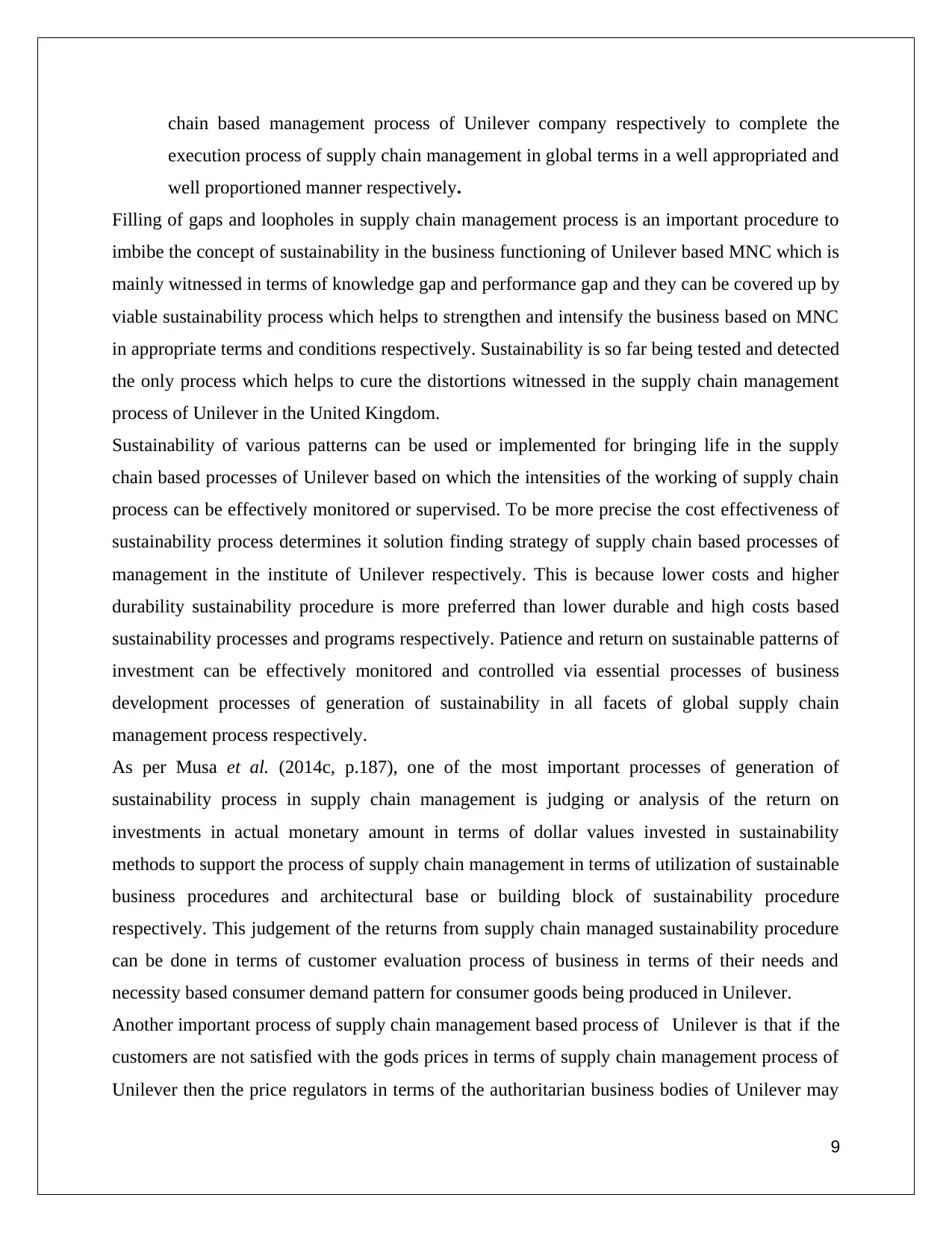
chain based management process of Unilever company respectively to complete the
execution process of supply chain management in global terms in a well appropriated and
well proportioned manner respectively.
Filling of gaps and loopholes in supply chain management process is an important procedure to
imbibe the concept of sustainability in the business functioning of Unilever based MNC which is
mainly witnessed in terms of knowledge gap and performance gap and they can be covered up by
viable sustainability process which helps to strengthen and intensify the business based on MNC
in appropriate terms and conditions respectively. Sustainability is so far being tested and detected
the only process which helps to cure the distortions witnessed in the supply chain management
process of Unilever in the United Kingdom.
Sustainability of various patterns can be used or implemented for bringing life in the supply
chain based processes of Unilever based on which the intensities of the working of supply chain
process can be effectively monitored or supervised. To be more precise the cost effectiveness of
sustainability process determines it solution finding strategy of supply chain based processes of
management in the institute of Unilever respectively. This is because lower costs and higher
durability sustainability procedure is more preferred than lower durable and high costs based
sustainability processes and programs respectively. Patience and return on sustainable patterns of
investment can be effectively monitored and controlled via essential processes of business
development processes of generation of sustainability in all facets of global supply chain
management process respectively.
As per Musa et al. (2014c, p.187), one of the most important processes of generation of
sustainability process in supply chain management is judging or analysis of the return on
investments in actual monetary amount in terms of dollar values invested in sustainability
methods to support the process of supply chain management in terms of utilization of sustainable
business procedures and architectural base or building block of sustainability procedure
respectively. This judgement of the returns from supply chain managed sustainability procedure
can be done in terms of customer evaluation process of business in terms of their needs and
necessity based consumer demand pattern for consumer goods being produced in Unilever.
Another important process of supply chain management based process of Unilever is that if the
customers are not satisfied with the gods prices in terms of supply chain management process of
Unilever then the price regulators in terms of the authoritarian business bodies of Unilever may
9
execution process of supply chain management in global terms in a well appropriated and
well proportioned manner respectively.
Filling of gaps and loopholes in supply chain management process is an important procedure to
imbibe the concept of sustainability in the business functioning of Unilever based MNC which is
mainly witnessed in terms of knowledge gap and performance gap and they can be covered up by
viable sustainability process which helps to strengthen and intensify the business based on MNC
in appropriate terms and conditions respectively. Sustainability is so far being tested and detected
the only process which helps to cure the distortions witnessed in the supply chain management
process of Unilever in the United Kingdom.
Sustainability of various patterns can be used or implemented for bringing life in the supply
chain based processes of Unilever based on which the intensities of the working of supply chain
process can be effectively monitored or supervised. To be more precise the cost effectiveness of
sustainability process determines it solution finding strategy of supply chain based processes of
management in the institute of Unilever respectively. This is because lower costs and higher
durability sustainability procedure is more preferred than lower durable and high costs based
sustainability processes and programs respectively. Patience and return on sustainable patterns of
investment can be effectively monitored and controlled via essential processes of business
development processes of generation of sustainability in all facets of global supply chain
management process respectively.
As per Musa et al. (2014c, p.187), one of the most important processes of generation of
sustainability process in supply chain management is judging or analysis of the return on
investments in actual monetary amount in terms of dollar values invested in sustainability
methods to support the process of supply chain management in terms of utilization of sustainable
business procedures and architectural base or building block of sustainability procedure
respectively. This judgement of the returns from supply chain managed sustainability procedure
can be done in terms of customer evaluation process of business in terms of their needs and
necessity based consumer demand pattern for consumer goods being produced in Unilever.
Another important process of supply chain management based process of Unilever is that if the
customers are not satisfied with the gods prices in terms of supply chain management process of
Unilever then the price regulators in terms of the authoritarian business bodies of Unilever may
9
⊘ This is a preview!⊘
Do you want full access?
Subscribe today to unlock all pages.

Trusted by 1+ million students worldwide
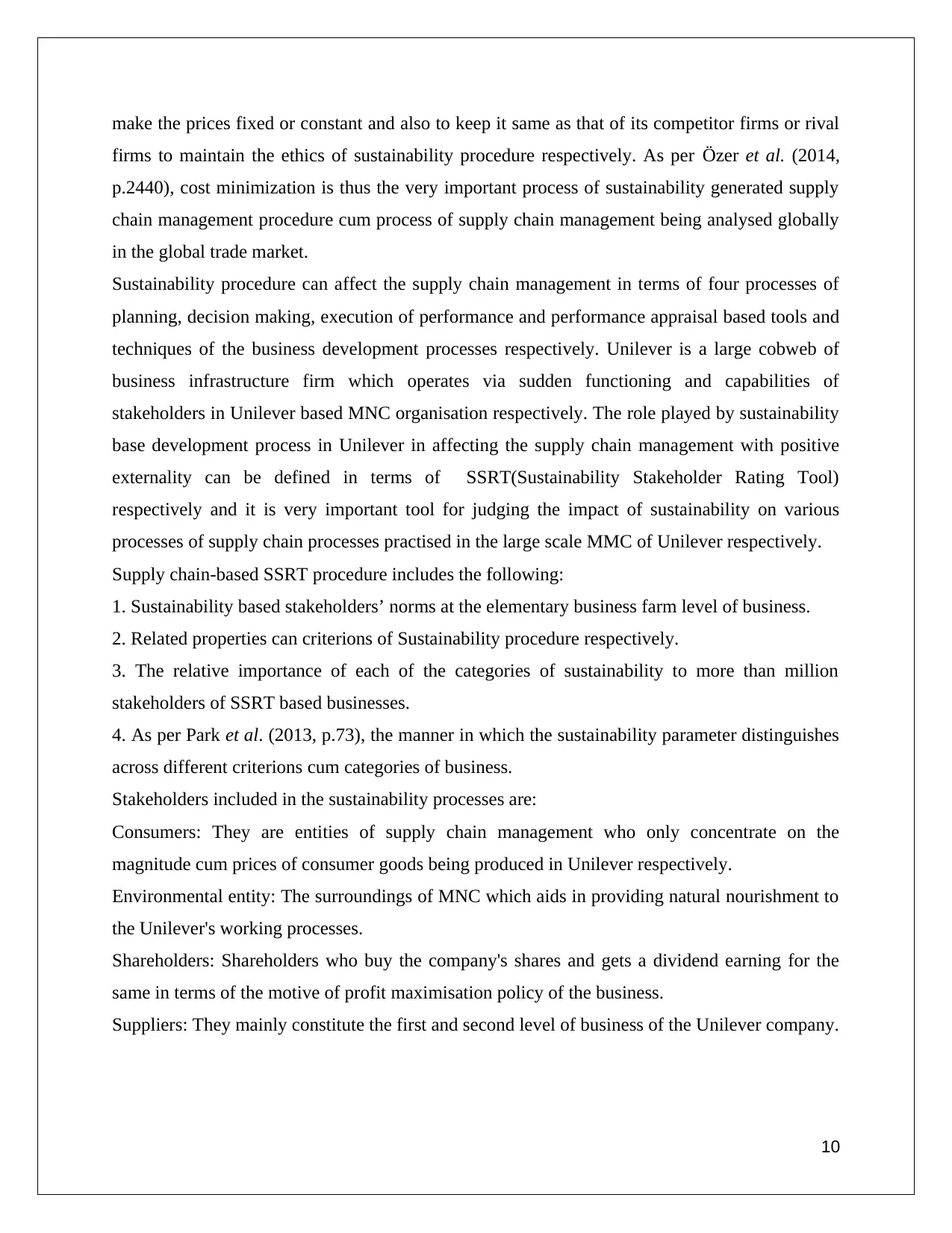
make the prices fixed or constant and also to keep it same as that of its competitor firms or rival
firms to maintain the ethics of sustainability procedure respectively. As per Özer et al. (2014,
p.2440), cost minimization is thus the very important process of sustainability generated supply
chain management procedure cum process of supply chain management being analysed globally
in the global trade market.
Sustainability procedure can affect the supply chain management in terms of four processes of
planning, decision making, execution of performance and performance appraisal based tools and
techniques of the business development processes respectively. Unilever is a large cobweb of
business infrastructure firm which operates via sudden functioning and capabilities of
stakeholders in Unilever based MNC organisation respectively. The role played by sustainability
base development process in Unilever in affecting the supply chain management with positive
externality can be defined in terms of SSRT(Sustainability Stakeholder Rating Tool)
respectively and it is very important tool for judging the impact of sustainability on various
processes of supply chain processes practised in the large scale MMC of Unilever respectively.
Supply chain-based SSRT procedure includes the following:
1. Sustainability based stakeholders’ norms at the elementary business farm level of business.
2. Related properties can criterions of Sustainability procedure respectively.
3. The relative importance of each of the categories of sustainability to more than million
stakeholders of SSRT based businesses.
4. As per Park et al. (2013, p.73), the manner in which the sustainability parameter distinguishes
across different criterions cum categories of business.
Stakeholders included in the sustainability processes are:
Consumers: They are entities of supply chain management who only concentrate on the
magnitude cum prices of consumer goods being produced in Unilever respectively.
Environmental entity: The surroundings of MNC which aids in providing natural nourishment to
the Unilever's working processes.
Shareholders: Shareholders who buy the company's shares and gets a dividend earning for the
same in terms of the motive of profit maximisation policy of the business.
Suppliers: They mainly constitute the first and second level of business of the Unilever company.
10
firms to maintain the ethics of sustainability procedure respectively. As per Özer et al. (2014,
p.2440), cost minimization is thus the very important process of sustainability generated supply
chain management procedure cum process of supply chain management being analysed globally
in the global trade market.
Sustainability procedure can affect the supply chain management in terms of four processes of
planning, decision making, execution of performance and performance appraisal based tools and
techniques of the business development processes respectively. Unilever is a large cobweb of
business infrastructure firm which operates via sudden functioning and capabilities of
stakeholders in Unilever based MNC organisation respectively. The role played by sustainability
base development process in Unilever in affecting the supply chain management with positive
externality can be defined in terms of SSRT(Sustainability Stakeholder Rating Tool)
respectively and it is very important tool for judging the impact of sustainability on various
processes of supply chain processes practised in the large scale MMC of Unilever respectively.
Supply chain-based SSRT procedure includes the following:
1. Sustainability based stakeholders’ norms at the elementary business farm level of business.
2. Related properties can criterions of Sustainability procedure respectively.
3. The relative importance of each of the categories of sustainability to more than million
stakeholders of SSRT based businesses.
4. As per Park et al. (2013, p.73), the manner in which the sustainability parameter distinguishes
across different criterions cum categories of business.
Stakeholders included in the sustainability processes are:
Consumers: They are entities of supply chain management who only concentrate on the
magnitude cum prices of consumer goods being produced in Unilever respectively.
Environmental entity: The surroundings of MNC which aids in providing natural nourishment to
the Unilever's working processes.
Shareholders: Shareholders who buy the company's shares and gets a dividend earning for the
same in terms of the motive of profit maximisation policy of the business.
Suppliers: They mainly constitute the first and second level of business of the Unilever company.
10
Paraphrase This Document
Need a fresh take? Get an instant paraphrase of this document with our AI Paraphraser
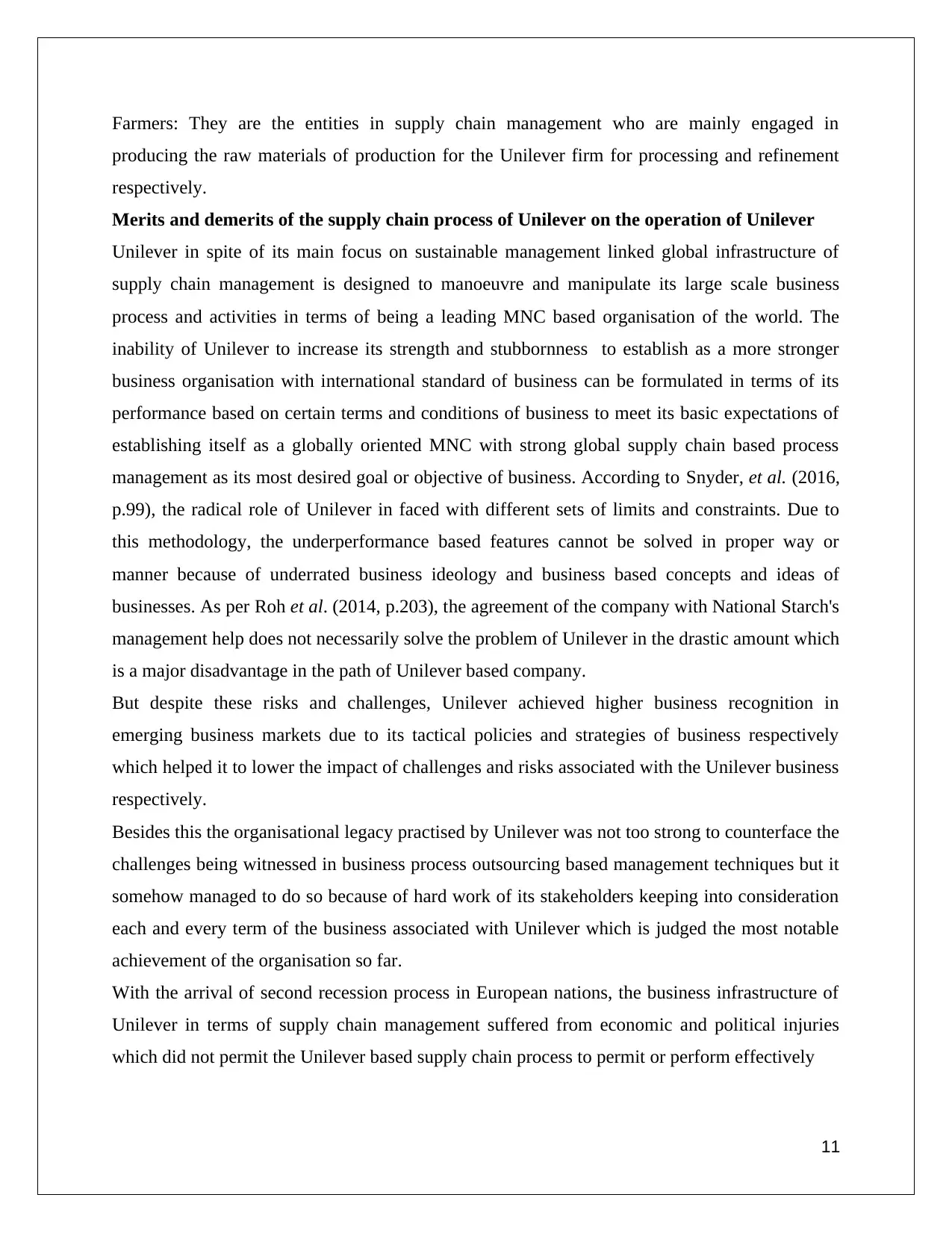
Farmers: They are the entities in supply chain management who are mainly engaged in
producing the raw materials of production for the Unilever firm for processing and refinement
respectively.
Merits and demerits of the supply chain process of Unilever on the operation of Unilever
Unilever in spite of its main focus on sustainable management linked global infrastructure of
supply chain management is designed to manoeuvre and manipulate its large scale business
process and activities in terms of being a leading MNC based organisation of the world. The
inability of Unilever to increase its strength and stubbornness to establish as a more stronger
business organisation with international standard of business can be formulated in terms of its
performance based on certain terms and conditions of business to meet its basic expectations of
establishing itself as a globally oriented MNC with strong global supply chain based process
management as its most desired goal or objective of business. According to Snyder, et al. (2016,
p.99), the radical role of Unilever in faced with different sets of limits and constraints. Due to
this methodology, the underperformance based features cannot be solved in proper way or
manner because of underrated business ideology and business based concepts and ideas of
businesses. As per Roh et al. (2014, p.203), the agreement of the company with National Starch's
management help does not necessarily solve the problem of Unilever in the drastic amount which
is a major disadvantage in the path of Unilever based company.
But despite these risks and challenges, Unilever achieved higher business recognition in
emerging business markets due to its tactical policies and strategies of business respectively
which helped it to lower the impact of challenges and risks associated with the Unilever business
respectively.
Besides this the organisational legacy practised by Unilever was not too strong to counterface the
challenges being witnessed in business process outsourcing based management techniques but it
somehow managed to do so because of hard work of its stakeholders keeping into consideration
each and every term of the business associated with Unilever which is judged the most notable
achievement of the organisation so far.
With the arrival of second recession process in European nations, the business infrastructure of
Unilever in terms of supply chain management suffered from economic and political injuries
which did not permit the Unilever based supply chain process to permit or perform effectively
11
producing the raw materials of production for the Unilever firm for processing and refinement
respectively.
Merits and demerits of the supply chain process of Unilever on the operation of Unilever
Unilever in spite of its main focus on sustainable management linked global infrastructure of
supply chain management is designed to manoeuvre and manipulate its large scale business
process and activities in terms of being a leading MNC based organisation of the world. The
inability of Unilever to increase its strength and stubbornness to establish as a more stronger
business organisation with international standard of business can be formulated in terms of its
performance based on certain terms and conditions of business to meet its basic expectations of
establishing itself as a globally oriented MNC with strong global supply chain based process
management as its most desired goal or objective of business. According to Snyder, et al. (2016,
p.99), the radical role of Unilever in faced with different sets of limits and constraints. Due to
this methodology, the underperformance based features cannot be solved in proper way or
manner because of underrated business ideology and business based concepts and ideas of
businesses. As per Roh et al. (2014, p.203), the agreement of the company with National Starch's
management help does not necessarily solve the problem of Unilever in the drastic amount which
is a major disadvantage in the path of Unilever based company.
But despite these risks and challenges, Unilever achieved higher business recognition in
emerging business markets due to its tactical policies and strategies of business respectively
which helped it to lower the impact of challenges and risks associated with the Unilever business
respectively.
Besides this the organisational legacy practised by Unilever was not too strong to counterface the
challenges being witnessed in business process outsourcing based management techniques but it
somehow managed to do so because of hard work of its stakeholders keeping into consideration
each and every term of the business associated with Unilever which is judged the most notable
achievement of the organisation so far.
With the arrival of second recession process in European nations, the business infrastructure of
Unilever in terms of supply chain management suffered from economic and political injuries
which did not permit the Unilever based supply chain process to permit or perform effectively
11
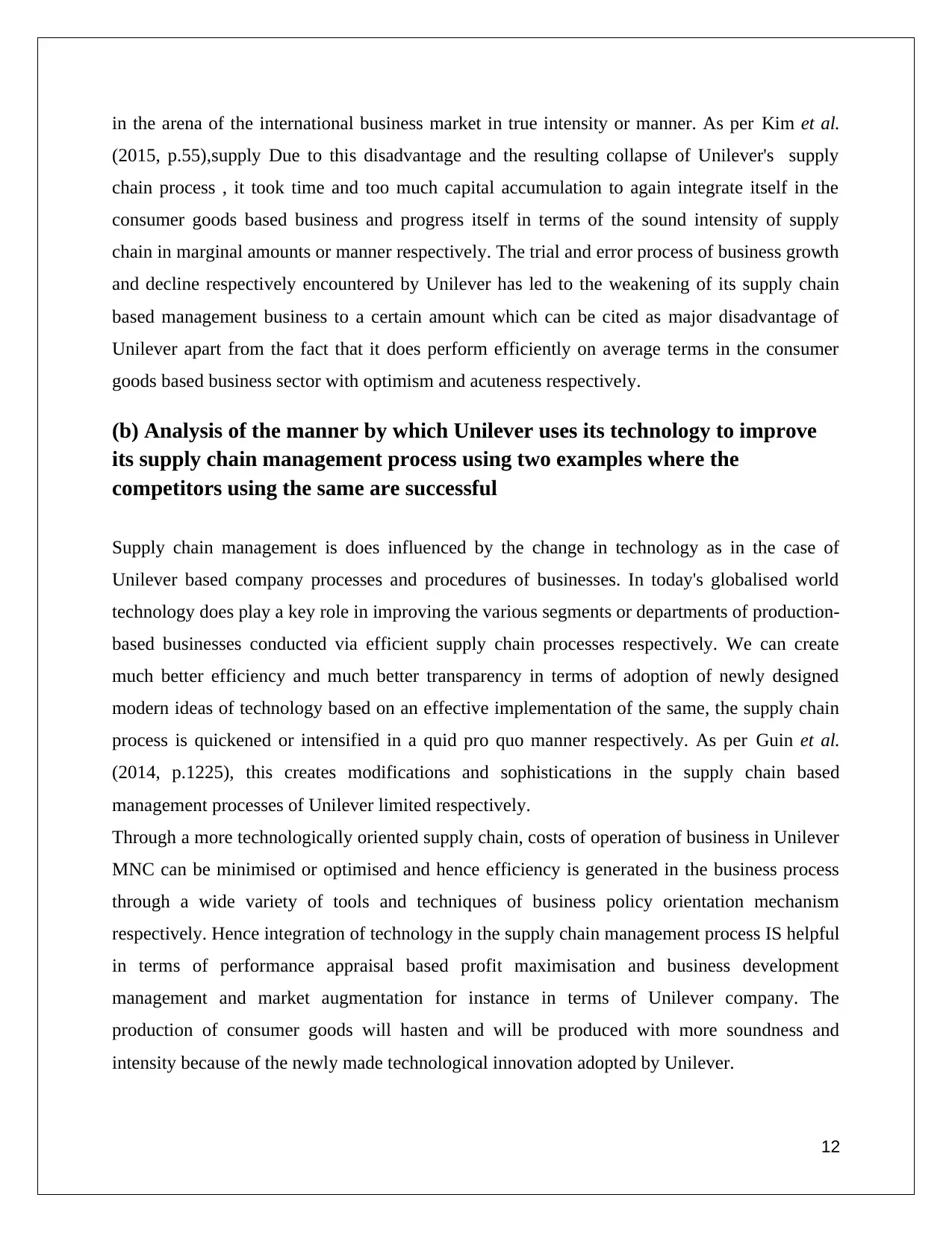
in the arena of the international business market in true intensity or manner. As per Kim et al.
(2015, p.55),supply Due to this disadvantage and the resulting collapse of Unilever's supply
chain process , it took time and too much capital accumulation to again integrate itself in the
consumer goods based business and progress itself in terms of the sound intensity of supply
chain in marginal amounts or manner respectively. The trial and error process of business growth
and decline respectively encountered by Unilever has led to the weakening of its supply chain
based management business to a certain amount which can be cited as major disadvantage of
Unilever apart from the fact that it does perform efficiently on average terms in the consumer
goods based business sector with optimism and acuteness respectively.
(b) Analysis of the manner by which Unilever uses its technology to improve
its supply chain management process using two examples where the
competitors using the same are successful
Supply chain management is does influenced by the change in technology as in the case of
Unilever based company processes and procedures of businesses. In today's globalised world
technology does play a key role in improving the various segments or departments of production-
based businesses conducted via efficient supply chain processes respectively. We can create
much better efficiency and much better transparency in terms of adoption of newly designed
modern ideas of technology based on an effective implementation of the same, the supply chain
process is quickened or intensified in a quid pro quo manner respectively. As per Guin et al.
(2014, p.1225), this creates modifications and sophistications in the supply chain based
management processes of Unilever limited respectively.
Through a more technologically oriented supply chain, costs of operation of business in Unilever
MNC can be minimised or optimised and hence efficiency is generated in the business process
through a wide variety of tools and techniques of business policy orientation mechanism
respectively. Hence integration of technology in the supply chain management process IS helpful
in terms of performance appraisal based profit maximisation and business development
management and market augmentation for instance in terms of Unilever company. The
production of consumer goods will hasten and will be produced with more soundness and
intensity because of the newly made technological innovation adopted by Unilever.
12
(2015, p.55),supply Due to this disadvantage and the resulting collapse of Unilever's supply
chain process , it took time and too much capital accumulation to again integrate itself in the
consumer goods based business and progress itself in terms of the sound intensity of supply
chain in marginal amounts or manner respectively. The trial and error process of business growth
and decline respectively encountered by Unilever has led to the weakening of its supply chain
based management business to a certain amount which can be cited as major disadvantage of
Unilever apart from the fact that it does perform efficiently on average terms in the consumer
goods based business sector with optimism and acuteness respectively.
(b) Analysis of the manner by which Unilever uses its technology to improve
its supply chain management process using two examples where the
competitors using the same are successful
Supply chain management is does influenced by the change in technology as in the case of
Unilever based company processes and procedures of businesses. In today's globalised world
technology does play a key role in improving the various segments or departments of production-
based businesses conducted via efficient supply chain processes respectively. We can create
much better efficiency and much better transparency in terms of adoption of newly designed
modern ideas of technology based on an effective implementation of the same, the supply chain
process is quickened or intensified in a quid pro quo manner respectively. As per Guin et al.
(2014, p.1225), this creates modifications and sophistications in the supply chain based
management processes of Unilever limited respectively.
Through a more technologically oriented supply chain, costs of operation of business in Unilever
MNC can be minimised or optimised and hence efficiency is generated in the business process
through a wide variety of tools and techniques of business policy orientation mechanism
respectively. Hence integration of technology in the supply chain management process IS helpful
in terms of performance appraisal based profit maximisation and business development
management and market augmentation for instance in terms of Unilever company. The
production of consumer goods will hasten and will be produced with more soundness and
intensity because of the newly made technological innovation adopted by Unilever.
12
⊘ This is a preview!⊘
Do you want full access?
Subscribe today to unlock all pages.

Trusted by 1+ million students worldwide
1 out of 18
Related Documents
Your All-in-One AI-Powered Toolkit for Academic Success.
+13062052269
info@desklib.com
Available 24*7 on WhatsApp / Email
![[object Object]](/_next/static/media/star-bottom.7253800d.svg)
Unlock your academic potential
Copyright © 2020–2026 A2Z Services. All Rights Reserved. Developed and managed by ZUCOL.



